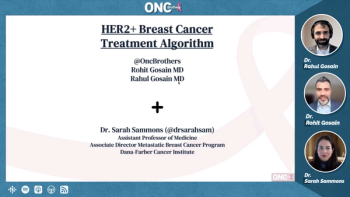
FDA Grants Priority Review to Tucatinib for HER2-Positive Breast Cancer Treatment
The FDA granted a priority review to a new drug application submitted by Seattle Genetics, Inc. for tucatinib to treat patients with HER2-positive breast cancer.
The FDA recently accepted for priority review Seattle Genetics’ new drug application (NDA) for tucatinib to treat patients with locally advanced unresectable or metastatic HER2-positive breast cancer, according to a news release.
The NDA is looking for approval of tucatinib used in combination with trastuzumab (Herceptin) and capecitabine in patients who have received at least 3 prior HER2-directed agents.
“The FDA’s filing of the tucatinib NDA marks an important step forward for patients with locally advanced or metastatic HER2-positive breast cancer, including those with brain metastases,” Clay Siegall, PhD, president and chief executive officer of Seattle Genetics, said in a news release. “We are working collaboratively with the FDA throughout the review process to bring this important medicine to patients as quickly as possible.”
The application is supported by results of the HER2CLIMB randomized trial, which were published in the New England Journal of Medicine and presented at the 2019 San Antonio Breast Cancer Symposium, comparing tucatinib with trastuzumab and capecitabine versus trastuzumab and capecitabine alone.
The NDA is being reviewed under the Real-Time Oncology Review (RTOR) Pilot Program after its initial December 2019 submission, as well as the Orbis Pilot Program of the FDA Oncology Center of Excellence. The framework for submission and review of oncology drugs is set by Project Orbis.
Tucatinib, the oral, small molecule tyrosine kinase inhibitor, was previously granted breakthrough therapy designation by the FDA for the same indication.
The FDA set The Prescription Drug User Fee Act date for August 20, 2020.
HER2-positive breast cancer includes tumors with high levels of protein, which promote the growth of cancer cells. According to the American Cancer Society, over 271,000 new cases of invasive breast cancer will be diagnosed in the United States in 2019. Further, HER2-positive breast cancer typically accounts for 15-20% of worldwide breast cancer cases.
As it currently stands, there are no approved therapies for HER2-positive metastatic breast cancer that improve progression-free survival or overall survival benefit.
Reference:
Seattle Genetics Announces FDA Filing Acceptance for Priority Review of Tucatinib New Drug Application (NDA) for Patients with Locally Advanced or Metastatic HER2-Positive Breast Cancer [news release]. Bothell, Washington. Published February 13, 2020.
Newsletter
Stay up to date on recent advances in the multidisciplinary approach to cancer.















































